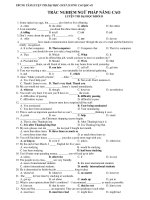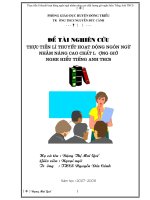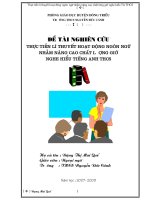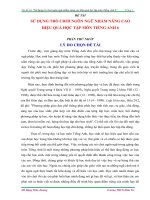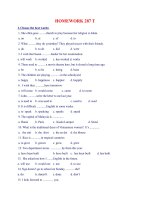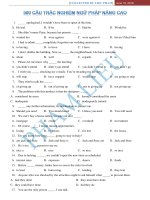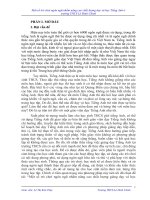Ngon ngu anh - vb2 - Ngữ pháp nâng cao bài kt 2
Bạn đang xem bản rút gọn của tài liệu. Xem và tải ngay bản đầy đủ của tài liệu tại đây (45.6 KB, 5 trang )
<span class="text_page_counter">Trang 1</span><div class="page_container" data-page="1">
<b>NGỮ PHÁP NÂNG CAO BÀI KT 2</b>
all the essays having been written, / the teacher sent the class homealways / examine the evidence carefully
at one point south of the river / the enemy have advanced a mile or twocertainly / he will be here this afternoon
considering his abilities, / he should have done better
gained entry into the building / by means of a bribe to the guardhaving been beaten once, / the boy didn’t want to go out alonein spite of his popularity, / he cannot be called a great writer.John / went to the library every night last week
naturally, / we paid for our own meals
roughly speaking, / the motorbike cost about 2,000 dollars
secretly / burned the letters from his lover in the fireplace last nightslowly / walked down the street with his son
sometimes / he walks down the road near the farm with his childrensprayed tear gas indiscriminately / on the protesters
strictly speaking, / nobody is allowed in here
suddenly / we met a beautiful girl on the way to the villagethe belief that the sun goes round the earth / is false
the boy standing in the corner / is Mary’s brotherthe only thing we can do / is write to him
the whole morning / he was working with his shears in the gardenturning toward the class, / the teacher asked for silence
very frankly, / I am very tired after the trip
working with his shears in the garden / the whole morning1. PART 1:
1. Some of the following are ambiguous and some are unambiguous. Mark the ambiguous ones A (ambiguous) and the other U (unambiguous). Explain the two meanings of those that are ambiguous:
</div><span class="text_page_counter">Trang 2</span><div class="page_container" data-page="2">Ex: 1. He drove up in a car with a souped-up motor that he had recently bought.[A], it may mean that he had recently bought either the car or the motor.
2. He buried the knife he found in the cellar.
3. I looked at the letter John was reading with unfeigned astonishment.4. He put away the ball in his pocket.
5. He put the balls in his pocket away.6. We watched them march away proudly.7. We proudly watched them march away.
8. The women with the children who were complaining were told to move along.9. The men with the dogs that were barking were told to move along.
10. Nobody discovered the books that he had stolen that morning.11. She decided to send the sheets to the cleaners that were dirty.
12. He lived on a street near the post office which was always full of people.13. Cows that eat cornflakes frequently have stomach trouble.
14. Cows that eat cornflakes frequently rarely have stomach trouble.15. Cows that eat cornflakes never have stomach trouble.
16. We were grateful for the blinds that covered the windows on sunny days.17. He couldn’t find the key to the jewel case which he had left on the table.
18. We found the man who had lost his way in the mountains with the help of two Boy Scouts.19. We suddenly noticed a man in a space suit which should have been sent to the cleaners.20. The police have trouble with the people who occupy these cottages all the time.
21. Children who stay out all night sometimes should be punished.22. Children who stay out all night should seldom be punished.23. She spoke to the boy with a warm smile.
24. She spoke to the boy with the warm smile.
25. She spoke to the boy with the warm smile that she reserved for children.2. He buried the knife he found in the cellar.
(A) - "in the cellar" could tell us either where he found the knife or where he buried it.3. I looked at the letter John was reading with unfeigned astonishment.
</div><span class="text_page_counter">Trang 3</span><div class="page_container" data-page="3">(A) - who was with unfeigned astonishment? (while John was reading the letter or when I looked at it ?)
4. He put away the ball in his pocket.
(A) - "in his pocket'' could either show the way he put away the ball (when he was tired of playing withit) or tell us where the ball is
5. He put the balls in his pocket away.
(U) - "in his pocket" identifies the place where the balls are 6. We watched them march away proudly.
(U) - “Proudly" modifies "march away"7. We proudly watched them march away.(U) - “Proudly" modifies "watched"
8. The women with the children who were complaining were told to move along.(A) - who was complaining? (The women or the children)
9. The men with the dogs that were barking were told to move along.(U) - The dogs were barking, not the men.
10. Nobody discovered the books that he had stolen that morning.
(A) - we are not sure that which verb or the whole sentence "that morning" modifies.11. She decided to send the sheets to the cleaners that were dirty.
(A) - "that was dirty " could refer to either "the sheets" or " the cleaners"12. He lived on a street near the post office which was always full of people.
(A) - we don't know for sure which "was always full of people", a street near the post office or the post office itself.
13. Cows that eat cornflakes frequently have stomach trouble.(U) - "frequently" modifies "have"
14. Cows that eat cornflakes frequently rarely have stomach trouble.
(A) - " frequently" or " rarely" could modify both "have" and "eat" ( Cows that frequently/rarely eat cornflakes rarely/frequently have stomach trouble /
15. Cows that eat cornflakes never have stomach trouble.(U) - "never" modifies "have"
16. We were grateful for the blinds that covered the windows on sunny days.(U) - the blinds in the sentence mean a kind of curtain, not blind people (the blind)
</div><span class="text_page_counter">Trang 4</span><div class="page_container" data-page="4">17. He couldn’t find the key to the jewel case which he had left on the table.(A) - which had he left on the table, the key or the jewel case?
18. We found the man who had lost his way in the mountains with the help of two Boy Scouts.(U) - “with the help of two Boy Scouts” modifies the verb" found"
19. We suddenly noticed a man in a spacesuit which should have been sent to the cleaners.(U) - “which should have been sent to the cleaners" defines "a spacesuit"
20. The police have trouble with the people who occupy these cottages all the time.(U) - "who occupy these cottages all the time" defines "the people"
21. Children who stay out all night sometimes should be punished.
(A) - "sometimes" could either modify " should be punished" or " stay out"22. Children who stay out all night should seldom be punished.
(U) - “Seldom” modifies "should be punished"23. She spoke to the boy with a warm smile.(U) - “With a warm smile " modifies "spoke"24. She spoke to the boy with a warm smile. (U) - “With a warm smile " modifies "spoke"
25. She spoke to the boy with the warm smile that she reserved for children.(U) - " That she reserved for children" modifies " the warm smile”
</div>

